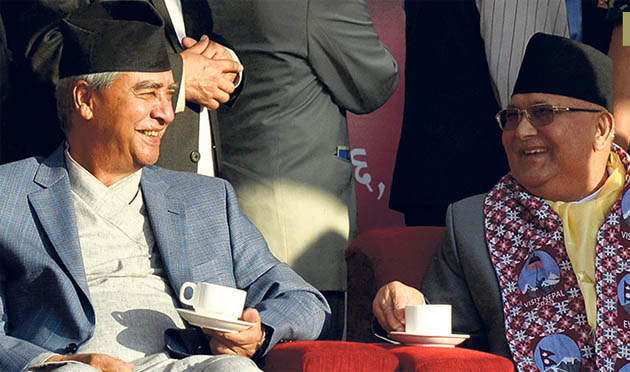KATHMANDU, Jul 13 : K P Sharma Oli, set to become Nepal’s new Prime Minister, on Saturday held consultations with his alliance partner Nepali Congress in preparing the list of ministers to be inducted into the new coalition government that is likely to be sworn in on Monday.
President Ram Chandra Paudel is expected to appoint Oli, 72, as the new Prime Minister of the Communist Party of Nepal-Unified Marxist Leninist (CPN-UML)-Nepali Congress (NC)coalition on Sunday.
“However, the President is likely to administer the oath to the new Prime Minister and other members of the cabinet on Monday morning. A small cabinet is likely to be announced on Monday before the oath-taking ceremony starts,” said sources close to the NC and UML.
Amid political turmoil in the Himalayan nation, CPN-UML chairman Oli, 72, is set to become prime minister once again after incumbent Prime Minister Pushpa Kamal Dahal ‘Prachanda’ on Friday failed to win a trust vote in Parliament.
Late on Friday night, Oli staked his claim to become the next Prime Minister with the backing of NC president Sher Bahadur Deuba and submitted the signature of 165 House of Representatives (HoR) members — 77 from his party and 88 from the NC — to form the government under Article 76-2 of the Constitution.
Out of a total of 21 ministries, the Nepali Congress will get nine and the UML eight plus the post of Prime Minister, a source close to Oli said.
“Key positions such as Home, Foreign, Finance and Energy will be divided between NC and UML. Nepali Congress is likely to get the portfolio of Home while the Finance will go to the UML,” the source said.
Earlier in the day on Saturday, CPN-UML held a high-level meeting to discuss the future course of action and finalise the names of ministers to be included in the new cabinet.
However, in the beginning, there will be a small cabinet, which will be expanded later, according to senior leader of the party and Standing Committee member Rajan Bhattarai.
Nepali Congress also held its Central Work Performance Committee meeting to discuss and finalise the ministerial list and the policy to be adopted by the party.
“The meeting discussed the ongoing political developments and finalised the names to be included in the Oli-led cabinet,” said former Deputy Prime Minister and senior NC leader Prakash Man Singh.
Although Deuba and Oli have already held preliminary discussions regarding the modality of the new coalition and power-sharing, the matter will be finalised by Saturday night.
During a crucial meeting last week, Deuba and Oli had agreed to share the post of Prime Minister by turns and that the CPN-UML chief would lead the government for the first 18 months.
Besides CPN-Maoist, CPN-Unified Socialist and Rastriya Swotantra Party, which had voted in favour of Prachanda during the floor test, Rastriya Prajatantra Party and other smaller parties are likely to back the NC-UML coalition.
Also, smaller parties such as Janata Samajwadi Party (JSP), JSP Nepal, Janamat Party, Nagarik Unmukti Party and Lokatantrik Samajwadi Party are likely to join the Oli-led coalition, according to party sources.
Prachanda, 69, chairman of the Communist Party of Nepal-Maoist Centre (CPN-MC), faced the trust vote as CPN-UML withdrew support from his government last week after inking a power-sharing deal with the largest party in the House, the NC.
Prachanda lost the vote of confidence as he received only 63 votes in the 275-member HoR with 194 votes against the motion. At least 138 votes are needed to win the vote of trust.
Nepal is facing frequent political instability as the country has seen 14 governments in the past 16 years after the Republican system was introduced.
Meanwhile, a leading newspaper in Nepal commented that it takes decades, even centuries, to build a nation.
The five-year term of Parliament is the minimum required for a set of leaders to make some impactful decisions for the country. There certainly are provisions for changes in the government, even in the midst of the parliamentary term, but these should be exceptional cases, The Kathmandu Post wrote in an editorial this week.
“What we have got, however, is a perpetuity of the coalition culture. It is this perpetuity that has halted the nation-building process for decades now. With the same set of three old men playing the hot potato game around power, nation-building has become a staccato performance at best.
“Just as one performer comes to the stage and starts his performance, he is pushed to the sidelines in the middle of the act,” it added, apparently referring to the exit of Prachanda as the prime minister, just 18 months after he assumed office. (PTI)


